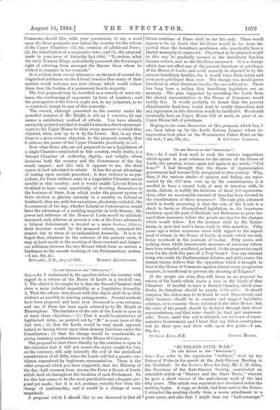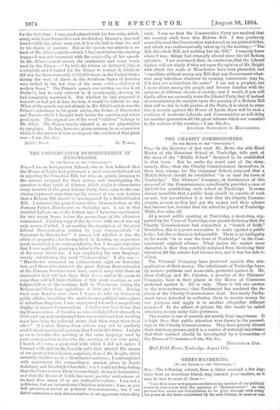"RUTHLESS CIVIL WAR."
[To THE EDITOR OF THE " SPECTATOR,"] S111,—You refer to the expression " ruthless," used by the Prince of Wales in his speech at the Anti-Slavery Meeting in the Guildhall. In the Leisure Hour for July, Mr. C. H. Allen, the Secretary of the Anti-Slavery Society, contributed an admirable article on "Slavery and the Slave Trade," wherein he gave a short resume of the anti-slavery work of the last fifty years. This article was reprinted and circulated before the meeting began. A copy, no doubt, bad been sent to the Prince. I attended the meeting chiefly from a warm attachment to a great cause, and also that I might hear our " half-sovereign" for the first time. I was much pleased with his fine voice, which, along with Lord Granville's and Archbishop Benson's, was well heard (while the others were not, it is a vile hall to hear in), and by his charm of manner. But as his speech was entirely a re- hash of Mr. Allen's article—which I had read before the meeting began—I was not impressed with the originality of his speech. In Mr. Allen's article occurs the sentiments and exact words used by the Prince :—" In 1865 the fetters of 6,000,00Q [this is a misprint, and I looked for the Prince to correct it, which he did not, for there were only 3,519,000 slaves in the United States during the war] of slaves in the Southern States of America were melted in the hot fires of the most ruthless civil war of modern times." The Prince's speech was written (so was Lord Derby's), but he only referred to it occasionally, showing be had completely mastered it. But whether he had prepared it himself, or had got it done for him, it would be difficult to say. What of the speech was not already in Mr. Allen's article was the Prince's references to his great uncles, the Dukes of Gloucester and Sussex, which I thought both beside the question and not in good taste. The original use of the word "ruthless " belongs to Mr. Allen. The Prince merely adapted it, as our playwrights do our plays. He has, however, given currency to an expression which is the reverse of true as respects the conduct of that great war.—I am, Sir, &c.,



































 Previous page
Previous page